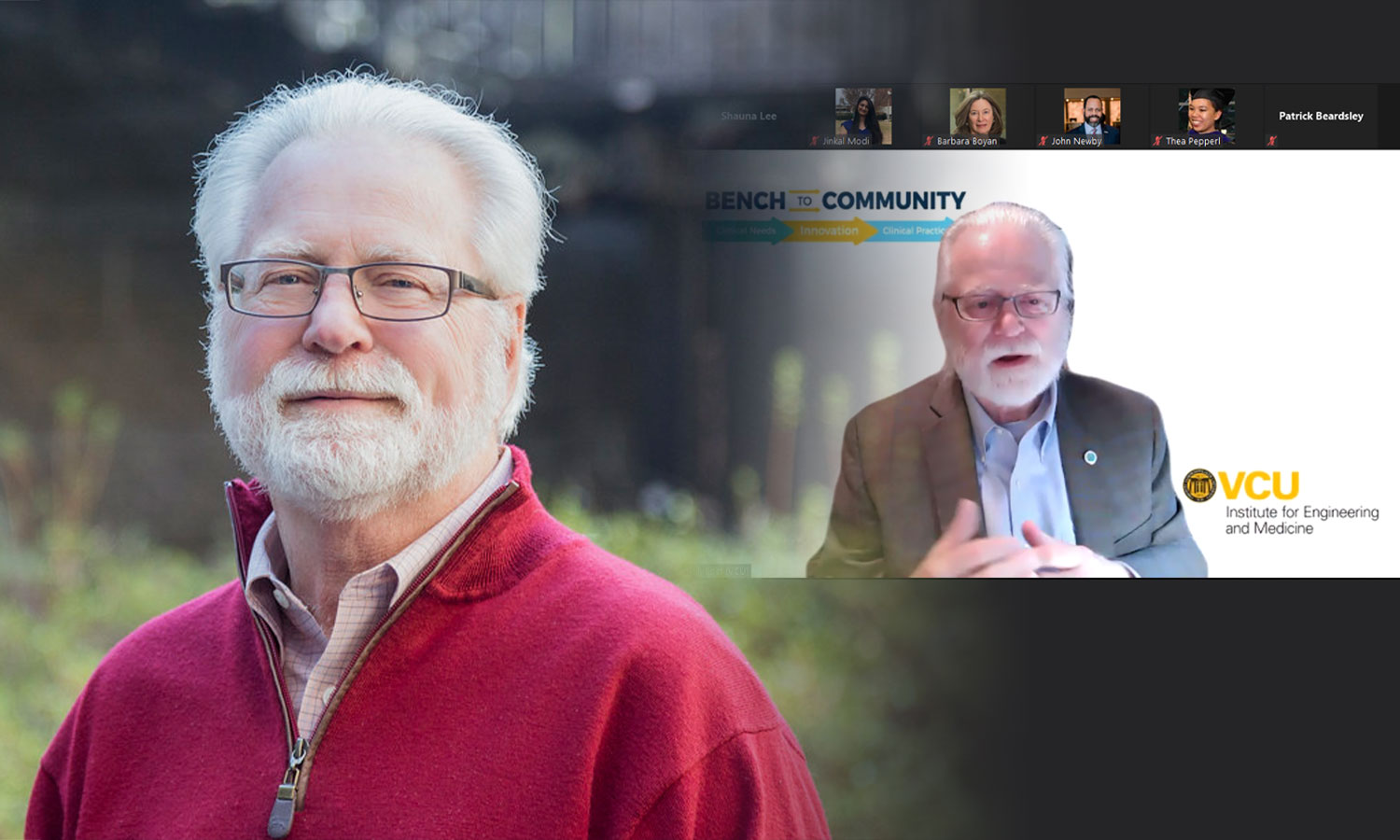By Jackie Kruszewski
C. Kenneth and Dianne Wright Center for Clinical and Translational Research
Every day, millions of people in health care, from oncologists to rehabilitation specialists to dentists, use the tools at their disposal to help patients get better.
“And everyone runs into times when they say, what if?” said L. Franklin Bost, MBA, IDSA, FAIMBE, professor and co-director of VCU’s Institute for Engineering and Medicine. “What if I had something better? What if I could give someone better treatment? What if I could improve this patient’s health care, or many patients’ health care?”
Maybe there’s a device that doesn’t quite do what a surgeon wants it to do, a machine that doesn’t fit a nurse’s needs, or a treatment that a researcher thinks a new drug formulation could improve.
In his 30-year industry career, Bost worked through many such challenges faced by medical practitioners. Later, as a VCU College of Engineering professor and co-director of the VCU Institute for Engineering and Medicine, he became a leader in medical device development and commercialization. Now his experience – and that of several other leaders in the field – is preserved in a six-part seminar series for faculty and clinicians looking for guidance in the complex process of medical device and drug development.
Hosted by the Institute for Engineering and Medicine and the Wright Center for Clinical and Translational Research, the Bench to Community series provides a framework and pathways for inventors whose ideas could lead to innovations in medical care that improve health care for all patients.
“It’s not a journey that you go on alone,” Bost said. “It’s a journey you go on with a multitude of partners.”
Videos of the series are open to the public and available for viewing at Kaltura. (CME credit is available for VCU physicians, surgeons and nurses who watch the recordings. They can email cmeinfo@vcuhealth.org with the course code found within the video.)
The first seminar in November 2020 provided an overview of fundamentals for over 50 medical professionals. The second seminar focused on medical device development, where Bost walked participants through the various stages: creating a project statement, determining stakeholders, obtaining input from the U.S. Food and Drug Administration, design concepts, prototyping, early user feedback and more.
He urged potential inventors to bring multiple parties into the process early and not shy away from concept development and amatuer prototype design.
“Go to the home store, go to the art store, hack it out in a computer design program to create an early ‘Frankenstein’ prototype – something to get it into three dimensions,” Bost said. “People often spend too much time conceptualizing.”
Seminar three featured Michael Mancini, Ph.D., who introduced the team at VCU’s Innovation Gateway and walked attendees through the process of invention disclosures and the U.S. patent process.
The fourth seminar on start-ups and faculty funding was led by Nicole Monk, MBA, of VCU Ventures, who presented on pathways to market for drugs and devices to get to the market. Inventors can either license something to industry or create their own start-up business.
“Licensing to industry is really a beautiful thing,” she said. “We should have a parade every time we license something to industry because it’s really a big deal.”
But it’s a hard thing to do, Monk added, and start-ups provide a valuable alternative for inventors. VCU Ventures has validation programs that help VCU inventors decide if a device or drug has potential, and its staff provides start-up navigation.
Session five featured, Thomas Miller, Esq., legal counsel from outside VCU, provided an overview of the FDA regulatory infrastructure for medical devices, drugs, and biologic products. Depending on the type of product, he explained, regulatory requirements affect many stages of research, development, manufacturing and commercialization.
A team from VCU Libraries closed out the series for this academic year with an in-depth look at the resources available for drug and device development at VCU Libraries. Topics included formulating research questions, patent searching, records management, proper literature review and databases.
“You’re going to get into some really quirky databases,” said Nina Exner, Ph.D., research data librarian. “As you work interdisciplinarily, finding the evidence in a specialty that you’re not familiar with can be very difficult.”
Bench to Community organizers plan to continue the series with further sessions. The Institute for Engineering and Medicine’s website will have more information.
You can watch the Bench to Community Seminar Series on its Kaltura page.
Contact Laura Osborne for questions or to provide input about the series.
